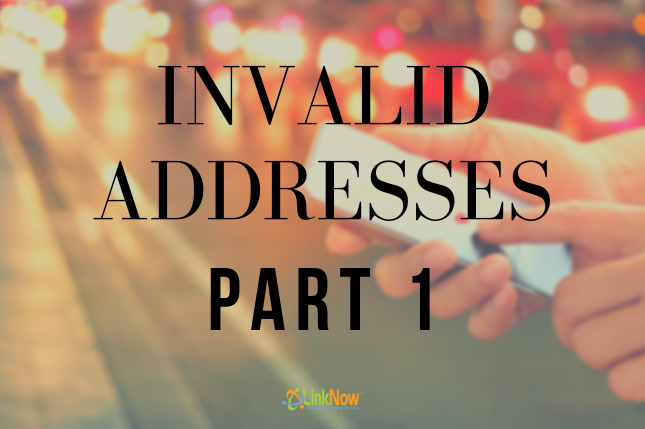


This is Part 1 of our Invalid Address series. Join us next week for Part 2, where we look at why Google is so strict about invalid addresses and what will happen if you don’t comply with their rules!
Have you ever tried to set up a Google My Business listing and been denied due to an invalid address? Have you ever had your GMB listing suspended and wondered why—only to find out later it was because of an invalid address?
Trying to sort through the Google tutorials, informationals, FAQs, forums, and comment threads about invalid addresses can be smash-your-head-into-the-nearest-wall-frustrating. And the risks are big: an invalid address could get your listing suspended, or worse, blacklisted from Google Maps forever.
Thankfully, the LinkNow Media local SEO team is here to make sense of it all. We’ve put together everything we currently know about invalid and valid addresses on Google My Business. If by the end of this article you’re still not sure whether you have an invalid address or not, give us a call at 1.888.667.7186 and we’ll help you out!
GMB’s number one rule is that your business address must be a real, physical location. Google usually verifies that all GMB listings are linked to physical addresses by sending out a postcard to the listed address or by doing a verification by phone.
Google will not allow businesses to use the following as business addresses:
In most cases, Google will not even allow you to set up your account with one of these types of addresses. But if you do, or if you change your address to one of these, you may end up with a suspended listing.
The point is, if you have a business with a storefront, clients must be able to visit your business at that storefront. And that storefront must be connected to your business. That means three things:
This measure prevents spammers from creating hundreds of fake listings, thereby disrupting the ability for legitimate businesses to rank on local search and get leads.
Unless you want to get your listing suspended—or possibly blacklisted from GMB—don’t use any of these to set up your GMB listing. It might work for a while. But you will get caught. And you will be removed from Google Maps. Just like that.
Google makes a division between addresses that can be shown and those that must be hidden.
If your business has a storefront, (retail shop, office, restaurant, etc.) that clients can actually visit, the address must be shown on Google My Business. This guarantees that the listing advertises a business that exists in the local area. It allows customers to find the address online and visit it.
If you run a service-area business and use your home address to create a GMB listing, it must be hidden online. Google will not allow anything but a true business address to be shown on the listing. However, hiding a home address will not hinder your ability to market locally. Google’s service-area categories allow you to market a hidden address.
The only case in which a home address can be made visible on Google is if you use your home as a business space. For example, many people run day cares, dog groomers, and massage clinics, out of their home. If you run a home-based business and want a Google listing though, you must have the necessary zoning permits, clearly visible signage and be available to receive customers at your business during your advertised operating hours.
However, service-area businesses like landscapers, electricians, plumbers, etc., that do not have an office where clients can meet them during stated operating hours, are not permitted to show their address online. It must remain hidden or else it will be considered invalid.
Google has sent out secret shoppers to verify that businesses with an exposed address on their listing are real and operating as advertised. They’ll be checking to see that you are open during your operating hours, so make sure you always have staff available to receive customers.
Otherwise, your address will be considered invalid and your account could be suspended pending re-verification. Repeat offenders even risk being blacklisted and removed from Google’s platform—a devastating consequence for any business that depends on being searchable online.
Virtual offices are becoming more popular than ever. And for good reason—many businesses that operate online or who are especially mobile, don’t need fixed office spaces. So, why not share a physical address with other, similarly flexible businesses?
For Google, the issue is misleading clients and spamming Google Maps. Google will not allow you to advertise the address of your yoga studio if your ‘yoga studio’ is a studio you rent at the YMCA a few hours a week. For Google, this is an invalid address because the YMCA is a separate business from yours. The same goes for consultants or lawyers who might rent a coworking space for a few hours each week—the coworking space is owned by the coworking company itself. Because virtual offices are not considered permanent business locations (they are subject to change regularly) only the business renting the property is allowed to use it for their business address on GMB.
Although there are some legitimate businesses that use virtual offices as a “storefront”, these listings are routinely flagged by Google. In order to keep an eye on these businesses, Google will send secret shoppers to visit them and verify that they are operating, with staff present, during their stated operating hours.
The idea is that, if Google allowed this, many businesses would take advantage and claim to be located locally across the city or region. The spam would pile up. Legitimate businesses in the area would suffer, and Google’s reputation would too.
However, if you run a business that sublets and pays rent on a space within another business, you may use it on a listing. All you need to do is offer proof of business such as a rental agreement or a photograph of your businesses sign located within another business space. For example, let’s say you run a barber shop that shares an open space with a coffee shop and a clothing retailer, you would be able to list your business on Google because you are renting the property—all you need is proof!
In addition to having proof of business, you also need a business phone number to distinguish yourself from the other businesses at the address. This allows Google to verify that you do indeed rent a permanent space and represent your business at that physical address.
At the end of the day, Google just wants you to prove that you are a real business. Which makes sense. After all, you’re using their free platform to advertise your services. For free. And they don’t like it very much when people use it to lie, cheat, spam, rip-off, or otherwise mislead their users.
Their response to invalid addresses is merciless. You could get blacklisted. You could get removed from Google Maps. How do you think that would affect your business? Next week we’re going to find out what happens if you don’t follow the rules!
Join us for Part 2, where we look at why Google is so strict and what will happen to you if you don’t comply with their regulations.
We know, it’s complicated. And with the ever-changing nature of Google Maps, the rules are always changing too. If you’re unsure about the validity of the address on your GMB listing, why not give us a call? We’ll make sure that your listing meets all of Google’s regulations—which is the first step toward ranking in local searches!
Contact LinkNow Media’s Local SEO team by calling 1.888.667.7186!
Share: